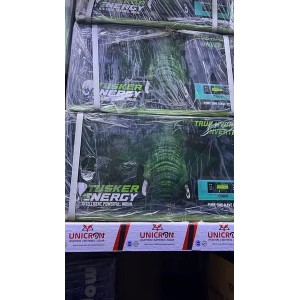

Banner




 Security policy
Security policy
(edit with the Customer Reassurance module)
 Delivery policy
Delivery policy
(edit with the Customer Reassurance module)
 Return policy
Return policy
(edit with the Customer Reassurance module)
1.5 kVA 12V Hybrid Inverter is a versatile and compact power inverter that is commonly used in small-scale renewable energy systems, especially solar setups. The term "hybrid" indicates that the inverter can manage multiple power sources, typically solar panels and the grid, but it can also work with batteries as part of an off-grid or backup power system.
Here’s a breakdown of the key features, benefits, and uses of a 1.5 kVA 12V Hybrid Inverter:
Key Features of a 1.5 kVA 12V Hybrid Inverter:
Power Rating:
The 1.5 kVA (kilovolt-ampere) rating refers to the inverter's capacity to handle electrical loads. It can supply up to 1.5 kW of continuous power or slightly more in peak power. This makes it suitable for small residential or off-grid solar systems.
1.5 kVA is often the upper limit for small appliances, lights, fans, and low-energy devices, but it may not be enough for larger appliances (e.g., air conditioners, water pumps) unless your load is well-managed.
12V Input:
The 12V input refers to the battery voltage that the inverter uses to operate. Inverters with 12V input are generally used in small off-grid systems or backup power applications, especially where 12V DC batteries (such as lead-acid or lithium-ion) are used as a power source.
12V systems are typically chosen for small solar setups, RVs, boats, or cabins, where large batteries (like 24V or 48V systems) aren't necessary.
Hybrid Functionality:
The hybrid feature means this inverter can work with both solar panels and the grid (if available). It can intelligently switch between solar power, battery storage, and grid power based on availability and need.
For instance, during the day when solar energy is abundant, the inverter will draw power from the solar panels. At night or during periods of low solar output, the inverter can switch to battery power or grid power (if connected to the grid), ensuring continuous electricity supply.
Battery Charging:
In hybrid inverters, the system usually includes a built-in battery charger, which means it can charge batteries from either solar energy or the grid.
The inverter can manage the charging and discharging of the battery, ensuring that the battery is properly charged and not overcharged, which is crucial for battery longevity.
Inverter/Charger Combo:
A hybrid inverter typically includes both an inverter (DC to AC conversion) and a charger (AC to DC conversion). This enables the inverter to power your devices when solar power is insufficient and charge the batteries when grid power or excess solar energy is available.
Pure Sine Wave or Modified Sine Wave:
Many hybrid inverters are pure sine wave inverters, which means they provide clean and stable AC power. This is crucial for sensitive electronic equipment like computers, televisions, and refrigerators.
Modified sine wave inverters may be cheaper but can cause some issues with sensitive appliances, as they deliver a less smooth waveform.
Benefits of a 1.5 kVA 12V Hybrid Inverter:
Cost-Effective for Small-Scale Systems:
This type of inverter is a cost-effective choice for small solar power systems that need to balance energy usage, battery storage, and occasional grid dependence. It’s great for small homes, cabins, or backup power in emergencies.
Energy Independence:
If you’re off-grid or in an area with unreliable grid power, a 1.5 kVA 12V hybrid inverter allows you to operate independently. You can use solar panels to charge your batteries and use that stored energy for your needs.
Automatic Power Source Switching:
Hybrid inverters are smart systems that automatically switch between solar, battery, and grid power depending on the availability of each source. This seamless transition ensures that you always have power when needed.
Battery Protection:
The inverter typically features built-in protections to ensure the safe charging and discharging of the connected batteries. This helps extend the lifespan of your battery bank and prevents overcharging or deep discharge.
Quiet Operation:
Since the inverter is often used in solar-powered setups, it operates quietly compared to fuel-based generators. There’s no noisy combustion engine running, which makes it ideal for residential areas, cabins, or campsites.
Energy Savings:
With solar energy, you can reduce your electricity bill by powering your devices directly from the sun during the day. Additionally, any excess solar energy can be stored in the batteries for later use, saving money on grid electricity.
Applications of a 1.5 kVA 12V Hybrid Inverter:
Off-Grid Homes or Cabins:
Perfect for small homes or cabins in remote areas where access to the grid is limited or unavailable. You can rely on solar panels and the hybrid inverter for your electricity needs.
Backup Power for Small Homes:
This inverter is ideal for backup power systems. When there’s a power outage, it can provide electricity from the battery or grid, ensuring your lights, fans, and other small appliances stay powered.
RV and Mobile Homes:
For RVs, campers, or boats that use 12V DC systems, a hybrid inverter is a great way to convert stored energy into AC power for appliances and electronics while also managing the charging of batteries from solar or the grid.
Small Solar Power Systems:
It’s perfect for small-scale solar setups where you don’t need a huge amount of power. You could power lights, fans, small refrigerators, and other low-energy appliances.
Sustainable Energy Systems:
Great for those looking to reduce their environmental footprint. By using solar power, you can lower your reliance on fossil fuels and grid power.
Important Considerations:
Load Management:
Since 1.5 kVA is a relatively small capacity, it’s important to manage the load carefully. Overloading the inverter can cause it to shut down or damage the system.
Make sure to calculate the power needs of your appliances to ensure the inverter can handle the total wattage.
Battery Size:
A 12V system typically works well with 12V batteries (such as deep cycle lead-acid or lithium batteries). The size and number of batteries will depend on how much power you need to store and how long you want the system to run without sun exposure.
Efficiency:
Check the inverter's efficiency rating, as this will impact how much of your solar power is actually usable. High-efficiency inverters waste less energy, which is important in off-grid applications.
Maintenance:
Hybrid inverters are low-maintenance, but it’s important to periodically check the system for any issues with the batteries, wiring, and inverter itself. Keep the system clean and ensure all connections are secure.
Your review appreciation cannot be sent
Report comment
Report sent
Your report cannot be sent
Write your review
Review sent
Your review cannot be sent

check_circle
check_circle